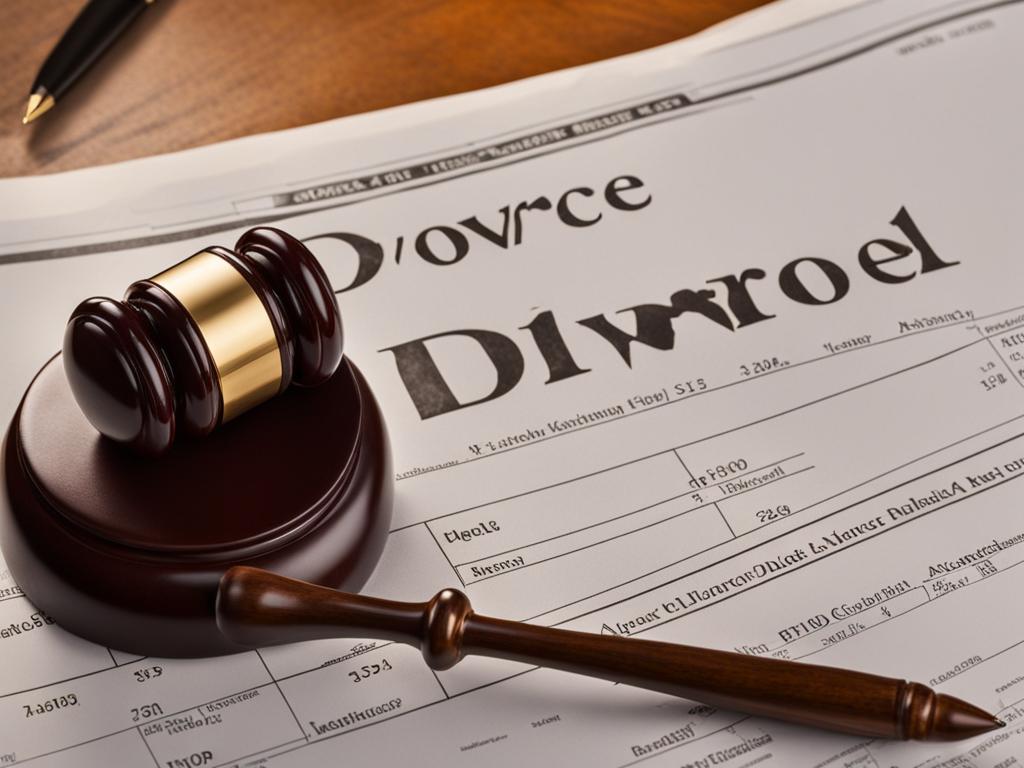Understanding When You Can Remarry After Divorce in California
In the state of California, there is a minimum statutory six-month waiting period before you can remarry after a divorce. Both parties involved in the divorce must wait for the six-month period to pass and for the court to enter a decree of dissolution restoring their non-married status. It’s important to note that the waiting period does not automatically end the marriage, and additional steps may be required to finalize the divorce and obtain the judgment of dissolution.
If you’re wondering when you can remarry after divorce in California, it’s crucial to understand the legal requirements and processes involved. This article will provide you with an overview of the waiting period, divorce laws, and the necessary steps to ensure eligibility for remarriage. By gaining a better understanding of these aspects, you can navigate through the divorce process with confidence and make informed decisions for your future.
Key Takeaways:
- The waiting period to remarry after a divorce in California is a minimum of six months.
- Both parties must wait for the court to enter a decree of dissolution to restore their non-married status.
- The waiting period does not automatically terminate the marriage.
- Additional steps may be required to finalize the divorce and obtain a judgment of dissolution.
- Consulting a family law attorney is advisable to ensure eligibility for remarriage and protect your rights throughout the process.
California Divorce Laws and Remarriage Eligibility
In California, the process of remarrying after a divorce is subject to specific laws and regulations. It is crucial to understand these laws to ensure eligibility for remarriage. California divorce laws state that it is illegal to remarry until your divorce is finalized and the court has officially dissolved your marriage. This means that both parties must wait for the divorce process to be completed, including the mandatory waiting period, before they can legally remarry.
The waiting period in California is a minimum of six months. This period begins as soon as the opposing party is served with the divorce petition. It is important to note that the waiting period cannot be skipped or shortened, and the divorce case cannot be completed before the six-month period has ended. The waiting period only marks the start of the process and does not automatically terminate the marriage.
“In California, it is illegal to remarry until your divorce is finalized and the court has officially dissolved your marriage.”
The length of a California divorce can vary depending on various factors, such as disagreements between both parties regarding child custody, spousal support, and property division. These disagreements can prolong the process and extend the waiting period before you can remarry. Consulting with a family law attorney can help navigate through the divorce process, ensuring a quicker resolution and eligibility for remarriage.
Remarriage Eligibility in California
To be eligible for remarriage in California, it is necessary to obtain a judgment of dissolution. This can be achieved through either a trial or a settlement process. If a dissolution case is settled and submitted to the court before the end of the six-month waiting period, a quick judgment of dissolution may be obtained. It’s important to note that the waiting period begins when the respondent is served papers or appears in court, not when the petition is filed.
It’s vital to seek legal counsel from a family law attorney if you are considering remarriage after a divorce in California. An experienced attorney can guide you through the legal requirements, ensure eligibility for remarriage, and protect your rights throughout the divorce process. They can also provide guidance on the implications of remarriage on alimony, child support, and other related matters.
Table: Summary of California Divorce Laws and Remarriage Eligibility
| Divorce Requirement | Waiting Period | Judgment of Dissolution |
|---|---|---|
| Divorce Finalization | Minimum of six months | Required |
| Remarriage Eligibility | Can only remarry after divorce is finalized | Obtain judgment of dissolution |
The Six-Month Waiting Period in California
In California, there is a mandatory six-month waiting period before you can remarry after filing for divorce. This waiting period begins as soon as the opposing party is served with the divorce petition. The waiting period cannot be skipped or shortened, and the divorce case cannot be completed before the six-month period has ended. It’s essential to understand that the waiting period only marks the start of the process and does not automatically terminate the marriage.
The purpose of the waiting period is to give both parties involved in the divorce ample time to reconsider their decision and potentially reconcile. It also allows for a cooling-off period in emotionally charged situations. During this time, couples are encouraged to work on resolving any remaining issues and reaching a settlement agreement.
It’s important to note that the waiting period does not automatically end the marriage. Once the six-month period has passed, additional steps may be required to finalize the divorce and obtain the judgment of dissolution. These steps may include submitting final paperwork, attending court hearings, and potentially engaging in settlement negotiations or a trial.
Summary:
- In California, there is a mandatory six-month waiting period before you can remarry after filing for divorce.
- The waiting period begins as soon as the opposing party is served with the divorce petition.
- The waiting period does not automatically terminate the marriage.
- Additional steps may be required to finalize the divorce and obtain the judgment of dissolution.
| Question | Answer |
|---|---|
| How soon can I remarry after filing for divorce in California? | You can remarry after the mandatory six-month waiting period has passed. |
| Can the waiting period be skipped or shortened? | No, the waiting period cannot be skipped or shortened. |
| Does the waiting period automatically end the marriage? | No, the waiting period does not automatically terminate the marriage. |
| What additional steps may be required after the waiting period? | Additional steps may include finalizing the divorce and obtaining a judgment of dissolution. |
Obtaining a Judgment of Dissolution in California
To legally remarry in California, you must obtain a judgment of dissolution. This judgment serves as the official document that declares the end of your marriage and restores your non-married status. Obtaining a judgment of dissolution requires navigating the divorce process and ensuring that all necessary steps are taken to complete the proceedings.
Divorce Settlement or Trial
There are two main paths to obtaining a judgment of dissolution in California: through a settlement or a trial. In a settlement process, both parties – the petitioner and respondent – come to an agreement on the terms of the divorce, including property division, child custody, and alimony. Once the settlement is reached, it is submitted to the court for review and approval.
If the divorce is not settled and disagreements persist, the case may proceed to trial. During the trial, both parties present their arguments and evidence, and the judge makes a final decision on the terms of the divorce. After the trial, the judge will issue a judgment of dissolution, officially ending the marriage and specifying the terms of the divorce.
The Six-Month Waiting Period
It’s important to note that the six-month waiting period in California must still be observed even after obtaining a judgment of dissolution. The waiting period begins when the respondent is served with the divorce papers or appears in court. The waiting period cannot be shortened or skipped, and the divorce case cannot be finalized before the completion of the waiting period.
| Step | Timeframe |
|---|---|
| Divorce filed and respondent served | Start of the six-month waiting period |
| Divorce settled or trial completed | Judgment of dissolution obtained |
| Waiting period ends | Eligibility to remarry |
Once the waiting period has ended and a judgment of dissolution has been obtained, you are legally eligible to remarry in California. It’s crucial to consult with a family law attorney throughout the divorce process to ensure that all necessary steps are taken and that you fully understand the implications of obtaining a judgment of dissolution.

Bifurcation of Marital Status in California
When going through a divorce in California, the minimum waiting period before you can remarry is six months. However, what happens if the divorce process is not yet complete after this waiting period? In such cases, you may consider seeking a “Bifurcation of Status” with the help of an attorney.
Bifurcation of marital status allows the court to grant your divorce, even if certain issues like property division, custody, and support are still under consideration. This means that you can legally remarry or file taxes as a single person while the remaining aspects of your divorce are being resolved.
“Bifurcation of Status in a divorce case can be a useful tool when there are lingering issues that may take longer to resolve. It allows the parties to move forward with their lives while still addressing the remaining matters in the divorce,” says Attorney Jane Roberts.
Eligibility for Bifurcation of Marital Status
Not all divorces qualify for a bifurcation of marital status. In California, the court will generally consider the following factors when deciding whether to grant a bifurcation:
- The complexity of the unresolved issues
- The impact on both parties involved
- The length of time the divorce has been pending
It is important to consult with a family law attorney to assess your specific situation and determine if seeking a bifurcation of marital status is an appropriate option for you.
Table:
| Factors Considered for Bifurcation of Marital Status | Explanation |
|---|---|
| Complexity of unresolved issues | The court will determine if the remaining matters in the divorce are particularly complex and may require additional time to resolve. |
| Impact on both parties involved | The court will consider the emotional and financial impact on both parties if the divorce continues without granting a bifurcation. |
| Length of time the divorce has been pending | If the divorce has been pending for an extended period, the court may be more inclined to grant a bifurcation to allow the parties to move forward. |
While a bifurcation of marital status can provide some relief during a prolonged divorce process, it is important to keep in mind that other issues will still need to be resolved. These may include property division, custody arrangements, and financial support. Therefore, it is crucial to continue pursuing a resolution for these matters and to consult with an experienced family law attorney who can guide you through the process.
Factors Affecting the Length of a California Divorce
The length of a divorce in California can vary depending on several factors. These factors can contribute to a longer process and extend the waiting period before you can remarry. It’s important to understand these factors and how they may impact the timeline of your divorce.
Disagreements and Complexities
One of the main factors that can affect the length of a divorce in California is the level of disagreement between the parties involved. If there are significant disputes regarding child custody, spousal support, division of property, or other important issues, it can prolong the process. Resolving these disputes through negotiation or court proceedings takes time and can delay the finalization of the divorce.
In addition, the complexity of the issues involved can also contribute to a longer divorce process. For example, if the couple has significant assets or debts to divide, it may require extensive financial analysis and evaluation. Similarly, if there are complex child custody issues, such as determining the best interests of the child or evaluating parental fitness, it can further prolong the proceedings.
Court Scheduling and Backlog
The length of a divorce can also be influenced by court scheduling and backlogs. Courts have limited resources and a high volume of cases to handle, which can result in delays. The availability of judges, court staff, and courtrooms can impact the scheduling of hearings and trial dates. If the court has a backlog of cases, it may take longer for your divorce case to be heard and resolved.
Attorney and Client Cooperation
The cooperation between the attorney and the client can play a role in the length of a divorce as well. It is crucial for both parties to provide timely and accurate information, respond to requests from the attorney, and actively participate in the process. Delays can occur if there is a lack of communication or cooperation between the attorney and the client.
| Factors Affecting the Length of a California Divorce |
|---|
| Disagreements and Complexities |
| Court Scheduling and Backlog |
| Attorney and Client Cooperation |

Impact of Remarriage on Alimony in California
Remarriage can have significant implications on alimony (spousal support) in California. According to California law, the obligation to pay alimony terminates if the supported spouse remarries. This means that the paying spouse is no longer required to provide financial support once the supported spouse enters into a new marriage. It is important to note that this termination of alimony occurs automatically without any legal action needed from the paying spouse.
However, it is crucial for the supported spouse to inform the paying spouse about their remarriage. If the supported spouse fails to disclose their new marital status and continues to receive alimony payments, they may be required to repay any support received after the date of their marriage. This ensures that the paying spouse is not financially responsible for the supported spouse’s needs when they are being taken care of by a new spouse.
To navigate the complexities surrounding alimony and remarriage in California, it is essential to consult with a family law attorney. They can provide guidance on the legal obligations and potential consequences related to alimony payments, ensuring that both parties understand their rights and responsibilities.

Table: Termination of Alimony After Remarriage in California
| Scenario | Alimony Payment |
|---|---|
| The supported spouse remarries and informs the paying spouse | Alimony payment terminates automatically |
| The supported spouse remarries but fails to inform the paying spouse | The supported spouse may be required to repay any alimony received after the date of marriage |
Impact of Remarriage on Child Support in California
Remarrying after a divorce in California does not directly impact child support obligations. Only the biological parents are legally obligated to provide financial support for their children, regardless of their marital status. However, it is important to note that the court may consider existing child support orders and the financial circumstances of both parents when determining child support payments.
If you are considering remarriage and have child support obligations, it is crucial to consult with a family law attorney to understand how your remarriage may affect your child support obligations in your specific situation. They can guide you through the legal process and help you navigate any potential changes in child support payments.
While remarriage itself does not automatically modify child support obligations, certain circumstances may arise where a modification is necessary. For example, if your new spouse has children from a previous relationship and you gain custody or financial responsibility for those children, it may impact the existing child support order. In such cases, it is important to seek legal advice to ensure appropriate adjustments are made.
Table: Child Support Payment Factors
| Factors Considered | Impact on Child Support Obligations |
|---|---|
| Income of both parents | Affects the amount of child support to be paid |
| Number of children | More children may increase the total child support amount |
| Cost of health insurance for the children | Includes the cost of providing health insurance coverage |
| Childcare expenses | May be factored into child support calculations |
| Special needs or medical expenses of the children | May impact the amount of child support |
Child support payments are determined based on various factors, and it is essential to provide accurate financial information to the court. The court’s primary concern is the best interests of the child, and child support calculations aim to ensure that the child’s needs are met. Consulting with a family law attorney can help you navigate the complexities of child support laws and ensure fair and appropriate payments.

Seek Legal Counsel for Remarriage After Divorce in California
If you are considering remarriage after a divorce in California, it is highly advisable to seek the assistance of a family law attorney. Navigating through the legal requirements and ensuring eligibility for remarriage can be complex, and having a knowledgeable attorney by your side can provide invaluable guidance throughout the process. Consulting an attorney for remarriage after divorce in California is essential to protect your rights and ensure that all necessary steps are taken.
An experienced family law attorney can help you understand the implications of remarriage on alimony, child support, and other related issues. They can provide you with the necessary information to make informed decisions and ensure that your interests are safeguarded. With their expertise, you can navigate the intricacies of the divorce process and work towards a quicker resolution, minimizing the waiting period before you can remarry.
Getting legal help to remarry after divorce in California is particularly important if there are specific considerations in your case, such as property division, custody disputes, or complex financial situations. An attorney can assess the unique aspects of your case and provide tailored advice and solutions. They can also assist you in understanding the potential impact of your remarriage on alimony and child support obligations, helping you navigate any legal implications that may arise.
Overall, consulting a family law attorney is essential for anyone considering remarriage after a divorce in California. They can provide the guidance and support necessary to navigate the legal requirements, protect your rights, and ensure a smoother transition into your new marital status. By seeking legal counsel, you can have peace of mind knowing that you have a professional advocating for your best interests every step of the way.

Consultation Benefits
- Expert guidance on the legal requirements for remarriage
- Protection of your rights throughout the divorce process
- Assistance in understanding the implications of remarriage on alimony and child support
- Tailored advice based on your unique circumstances
- Minimization of waiting period before remarrying
Conclusion
In conclusion, the waiting period to remarry after a divorce in California is a minimum of six months. This statutory requirement ensures that both parties have an adequate amount of time to finalize their divorce and obtain a judgment of dissolution. It’s important to note that the waiting period begins as soon as the divorce petition is served to the opposing party, and it cannot be skipped or shortened.
The length of a divorce in California can vary depending on various factors, such as disagreements between both parties regarding issues like child custody, spousal support, and property division. These factors can prolong the process and extend the waiting period before you can remarry. Seeking the guidance of a family law attorney is crucial to navigate through the divorce process and ensure a quicker resolution.
When considering remarriage after a divorce, it is essential to understand the specific implications on alimony, child support, and other related matters. In California, the obligation to pay alimony terminates upon remarriage, while child support obligations remain the responsibility of the biological parents. However, the court may consider existing child support orders and the financial circumstances of both parents when determining child support payments.
To protect your rights and ensure eligibility for remarriage, consulting with a family law attorney is highly recommended. They can provide valuable guidance on the legal requirements, help you navigate the divorce process, and provide insight into the specific implications of remarriage in your case. By understanding the waiting period, obtaining a judgment of dissolution, and seeking legal counsel, you can proceed with confidence towards remarriage after a divorce in California.
FAQ
When can I remarry after divorce in California?
In California, there is a minimum statutory six-month waiting period before you can remarry after a divorce.
What is the waiting period to remarry after divorce in California?
The waiting period to remarry after divorce in California is six months.
Can I remarry before the six-month waiting period ends?
No, you cannot remarry before the six-month waiting period ends. The waiting period must be completed before remarriage is allowed.
What is a judgment of dissolution?
A judgment of dissolution is the official court decree that ends a marriage. It is necessary to obtain this judgment before you can legally remarry.
How long does a divorce take in California?
The length of a divorce in California can vary depending on various factors, such as disagreements between both parties. It is advisable to work with an attorney for a quicker resolution.
What is the impact of remarriage on alimony in California?
In California, the obligation to pay alimony (spousal support) terminates if the supported spouse remarries. However, it is important to consult with a family law attorney for specific implications in your case.
Does remarriage affect child support obligations in California?
Remarriage does not directly impact child support obligations in California. It is important to consult with a family law attorney to understand how remarriage may affect child support in your specific situation.
Should I seek legal counsel for remarriage after divorce in California?
Yes, seeking the assistance of a family law attorney is highly recommended if you are considering remarriage after a divorce in California. They can guide you through the legal requirements and protect your rights throughout the process.

